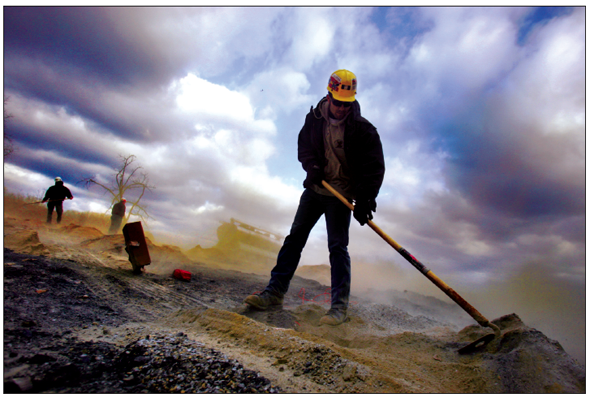Debates rage in search for answers on the future of coal

April 30, 2009
Surface mining in its active phase is ugly.
Everyone seems to agree on that, from the coal company executives to the UK students who intern there and especially to the university’s anti-coal activists. What they don’t agree on is the future of coal mining,
energy consumption and reclaiming the abandoned mine lands.
With coal consumption expected to rise, the activists want answers now, while the coal companies say the technology is not available, or affordable.
The only certainty: No one has reconciled the future of coal.
The state of coal: UK mining engineer finds himself at odds with much of campus
Coal runs through Nate Waters’ blood.
It killed his grandfather and provides power for the lights in the classrooms where he takes his final classes to become a mining engineer. It hides beneath the earth in his hometown, and it paid for his new truck. Despite going to the flagship university of the state that is the third-leading producer of coal in the country, Waters finds himself among a minority, where there are students protesting coal and faculty with national reputations for fighting against mountaintop removal. He calls himself an environmentalist, while others have called him a “friend of death.â€
Because at UK, he is not a mining engineering student or an environmentalist; Nate Waters is a coal miner.
Coal executive, activist disagree on results of mining
Erik Reece and Don Gibson are outspoken about coal use, but the only thing they can manage to agree on is thinking the other is wrong.
Reece, who teaches English at UK, is one of Kentucky’s most dynamic anti-coal activists, who gained national attention for his article “Death of a Mountain,†published in Harper’s Magazine and for writing a book, “Lost Mountain: A Year in the Vanishing Wilderness,†that told the story of a mountain’s demise due to mining in Perry County, Ky.
Gibson is a coal company executive who has spent his career extracting coal, and, if it’s necessary, removing a mountaintop to do it. He is also highly involved in the reclamation of these mountains, or returning the original vegetation. Gibson is director, permitting and regulatory affairs for International Coal Group in Perry County, which is the second-highest coal-producing county in the state, with 12.7 million tons per year.
On principles alone, it seems to make sense why the two might not see eye to eye, but it’s much more complicated than that.
Future of energy use depends on discussion
I have been around coal for as long as I can remember, but I never really questioned coal mining until I came to college.
My grandfather died of complications related to black lung, even though the company officials told him to just cough up the coal dust and he would be fine. A coal mine collapse killed one of my cousins, and another collapse put an uncle on disability. Another one of my uncles died in a car crash on his way back from work, again in the mines. My great-grandfather helped start the union in Harlan County, Ky. by meeting with other miners at night in the woods to get organized. It was too dangerous to even speak of opposing the coal companies in those days, and gun fights and murders gave my home county its infamous name, “Bloody Harlan.â€
I never really thought of the environmental or economic consequences because coal miners provided for their family.






















































































































































